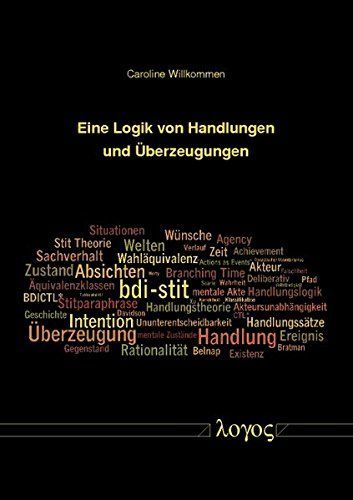
Eine Logik von Handlungen und Überzeugungen
English summary: The desire to examine the logic of action has a long tradition going back to Anselm of Canterbury and reaching up to the present day. What distinguishes an action? When does a sentence describe an action? And how can one describe this within a logical system? The Stit theory provides a simple answer to the last two questions. A sentence (symbol for Ancient Greek Phi) is an action, as far as it can be transformed to 'agenti sees to it that (symbol for Ancient Greek Phi)' without changing the logical value of the sentence. This study demonstrates why this view is not only straight forward and practical when it comes to complementing this type of logic of action with operators of belief, desire and intention, but it also shows why such a description can be reconciled with Donald Davidson's thesis that actions are based on events. Thus the study attempts to build a bridge between the Stit theory and Davidson's theory of action in which the concept of intention plays a role. German description: Eine Logik von Handlungen betrachten zu wollen, hat eine lange Tradition von Anselm von Canterbury bis in die Gegenwart. Was kennzeichnet eine Handlung? Wann beschreibt ein Satz eine Handlung? Und wie lasst sich dies in einem logischen System beschreiben? Die Stit-Theorie gibt eine einfache Antwort auf die beiden zuletzt gestellten Fragen. Ein Satz varphidruckt eine Handlung aus, wenn es einen Akteur gibt, so dass sich der Wahrheitswert des Satzes nicht andert, wenn er durch "der Akteur sorgt dafur, dass varphi" paraphrasiert wird.In diesem Buch wird gezeigt, warum diese Ansicht nicht nur einfach und praktisch ist, um eine solche Handlungslogik um Operatoren fur Uberzeugungen, Wunsche und Intentionen zu erweitern, sondern auch warum sich diese Beschreibung mit der Ansicht Donald Davidsons vereinen lasst, dass Handlungen Ereignisse zugrunde liegen. So wird versucht, eine Brucke zwischen der Stit-Theorie und Davidsonscher Handlungstheorie zu schlagen, bei der der Begriff der Intention eine Rolle spielt. Dabei wird der Intentionsoperator in dem logischen System bdi-stit_{dint, bestehend aus Handlungsoperatoren und den Operatoren fur die mentalen Zustande, alternativ axiomatisiert.